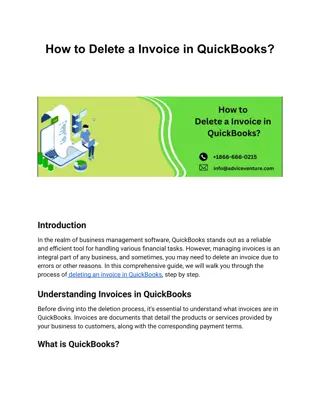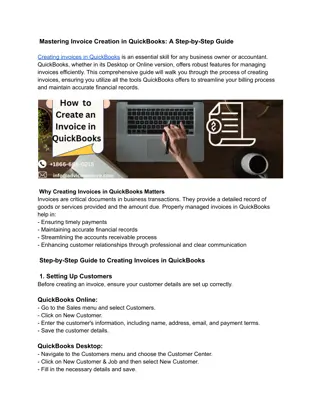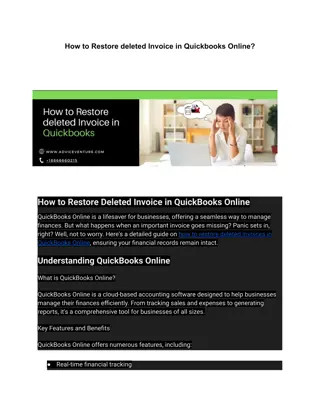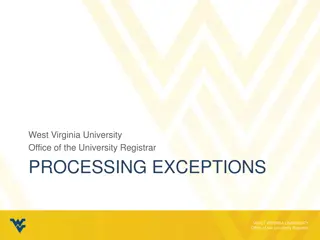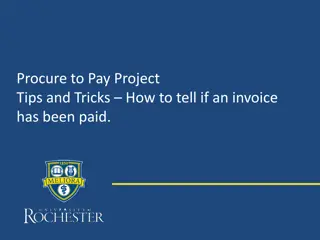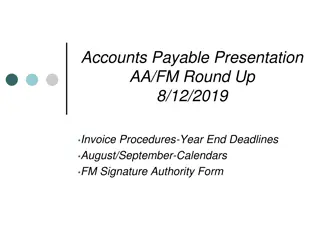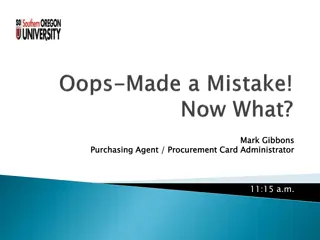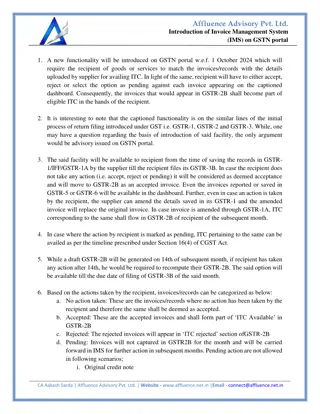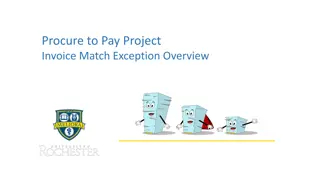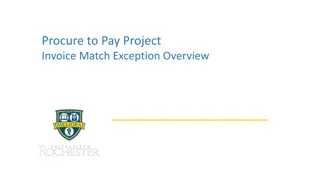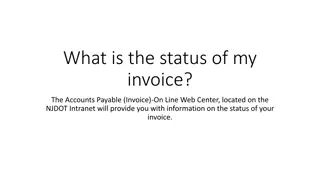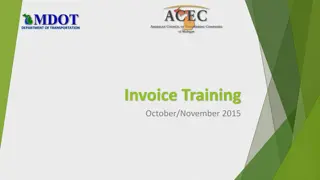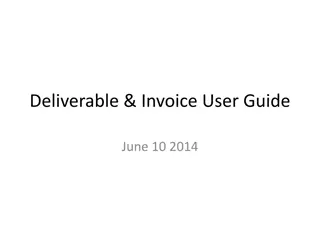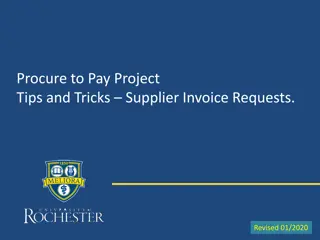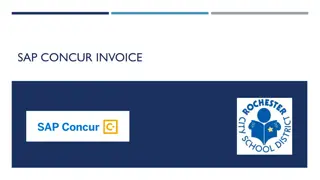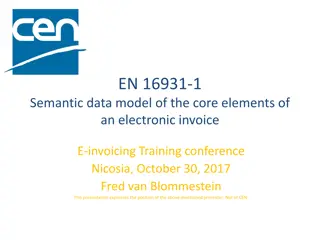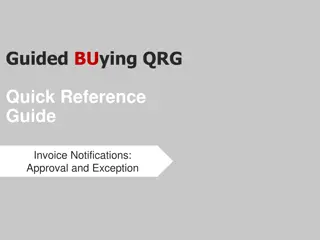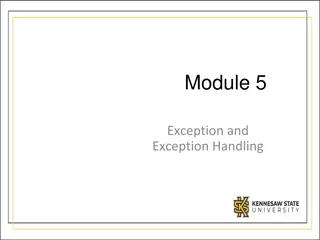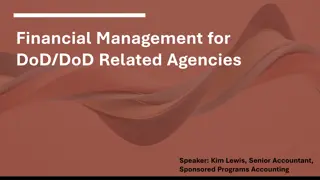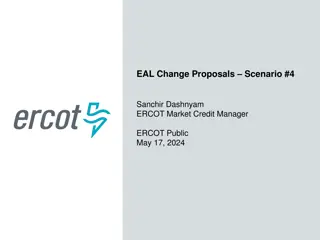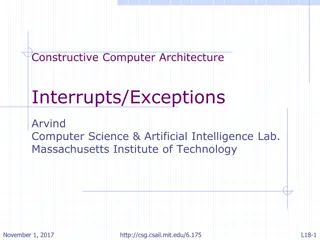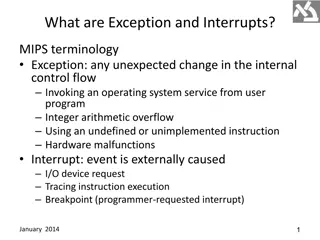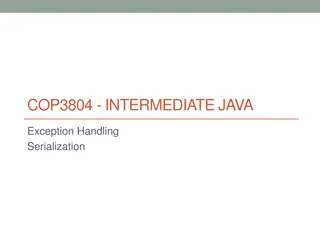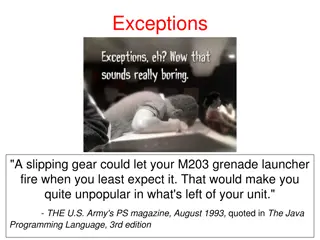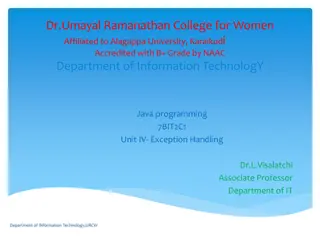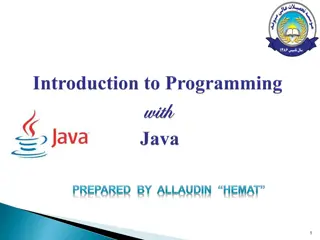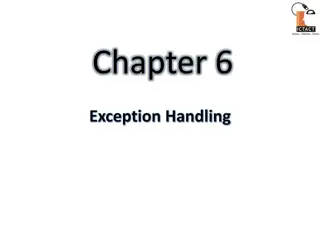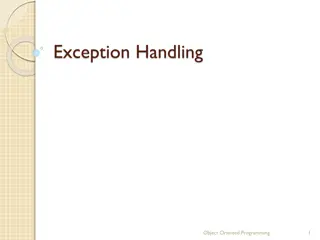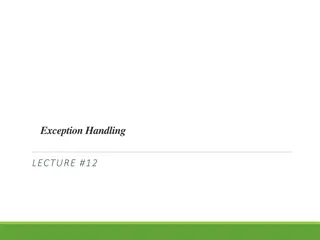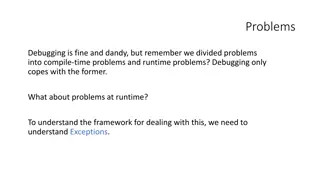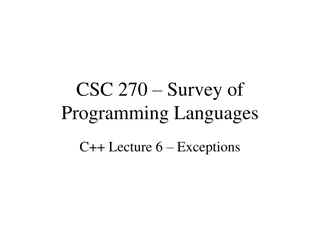How to Delete a Invoice in QuickBooks?
How to Delete a Invoice in QuickBooks?\nTo delete an invoice in QuickBooks, follow these steps meticulously. First, access the \"Invoices\" section after logging into your QuickBooks account. Then, locate the specific invoice you wish to remove from the list displayed. Open the invoice to view its d
0 views • 4 slides
Mastering Invoice Creation in QuickBooks_ A Step-by-Step Guide
Learn how to create an invoice in QuickBooks with our detailed guide. Whether you're using QuickBooks Online or Desktop, we'll walk you through each step, from setting up customers to customizing invoice templates and sending out professional invoices. Our guide ensures you can efficiently manage yo
1 views • 4 slides
How to Restore deleted Invoice in Quickbooks Online?
How to Restore deleted Invoices in Quickbooks Online?\nRestoring a deleted invoice in QuickBooks Online involves using the Audit Log to track and recreate it. First, access the Audit Log via the Gear icon under \"Tools\" and identify the deleted invoice details. Then, manually recreate the invoice b
1 views • 7 slides
Common Invoice Exceptions in Guided Buying
In guided buying, invoice exceptions play a critical role. Learn about common invoice exceptions such as price variances, quantity discrepancies, and auto-reject scenarios. Discover how to handle these exceptions effectively to ensure smooth procurement processes.
1 views • 8 slides
Managing Exceptions in West Virginia University Office of the University Registrar
West Virginia University's Office of the University Registrar processes exceptions through Degree Works, allowing advisors to make edits on a case-by-case basis. Understanding exception types like Force Complete and Substitute is crucial for properly managing student records to ensure accurate acade
4 views • 14 slides
Update on Invoice Processing Platform (IPP) Implementation
The Invoice Processing Platform (IPP) is a web-based system provided by the U.S. Treasury for tracking invoices from award to payment notification. This update outlines the scope, schedule, and implementation overview, including phases and actions needed for successful invoicing. Vendors are require
0 views • 8 slides
Easily Determine if an Invoice has been Paid - Procure to Pay Project Tips
Wondering how to tell if an invoice has been paid? Follow simple steps like checking the payment status and viewing payment details to quickly confirm the payment status. Utilize supplier invoice numbers and payment tabs for efficient tracking.
1 views • 6 slides
Hearsay Exceptions for Children in Legal Proceedings
Exploration of hearsay exceptions for children in legal contexts, including how out-of-court statements are considered, the importance of minimizing emotional trauma for children, and specific cases illustrating the application of special exceptions in child abuse situations.
1 views • 22 slides
Accounts Payable and FY18 Invoice Deadlines and Procedures Overview
Accounts Payable department details, staff members, invoice procedures, fiscal year 2018 invoice and travel deadlines, along with a reminder for submitting invoices and travel documents. Also includes information on financial manager signature authority form submission for the new fiscal year.
0 views • 8 slides
Invoice Entry Process and Common Mistakes in Banner FIS System
Detailed insights and reminders for navigating the complex invoice entry process in Banner FIS system, highlighting common mistakes and solutions. Emphasizes the importance of attention to detail and offers practical guidance for invoice management to ensure accuracy and efficiency.
0 views • 13 slides
Introduction of Invoice Management System (IMS) on GSTN portal
The new Invoice Management System (IMS) on the GSTN portal, launching in October 2024, aims to streamline the GSTR-2B invoice matching process. This update simplifies claiming Input Tax Credit (ITC) by allowing businesses to easily match, accept, or
0 views • 2 slides
Invoice Match Exception Overview - P2P Staff Meeting October 30, 2018
Detailed information on invoice match exceptions discussed at the P2P Staff Meeting on October 30, 2018, including rules, types of exceptions, review steps, and resources for assistance in Workday procurement processes.
0 views • 10 slides
Overview of Procure-to-Pay Project Invoice Match Exception Rules
This provides a detailed overview of the invoice match exception rules for a Procure-to-Pay project discussed during the P2P staff meeting on October 30, 2018. It covers specific rules related to purchasing, different types of exceptions, system tolerances, review steps, and updates made to freight
0 views • 12 slides
Hearsay Rules and Exceptions in Legal Proceedings
Hearsay evidence, which is an out-of-court statement introduced for the truth of its content, is considered less reliable in court due to factors like lack of oath, inability to see demeanour of declarant, and absence of cross-examination. Various historical judgments and legal exceptions allow cert
0 views • 90 slides
Check Invoice Status on NJDOT Intranet
Access the Accounts Payable (Invoice) Online Web Center on the NJDOT Intranet to find information on the status of your invoice. Follow step-by-step instructions to navigate through the system, enter search criteria, and view the status of your invoice. Utilize the Vendor Reference to track invoices
0 views • 17 slides
Exceptions in Degree Works
The exceptions in Degree Works allow for modifications to academic requirements, such as for completing rules, substituting courses, adding new course options, and applying specific courses to rules. These exceptions provide flexibility while ensuring academic standards are upheld. However, caution
0 views • 24 slides
Exceptions in Degree Works
Dive into the various exception types in Degree Works, such as Force Complete, Substitute, Also Allow, and Apply Here. Explore how these exceptions impact course requirements, credits, and student data, with caution advised for using the powerful Force Complete option. Learn about the flexibility an
0 views • 25 slides
Effective Training and Improvements for Transportation Invoice Procedures
Comprehensive training and improvements for the Department of Transportation invoice processes in October/November 2015. The content covers agenda, site logistics, invoice spreadsheet definitions, payment methods, contractual relationships, budget types, modifications, and overall enhancements for b
0 views • 36 slides
Streamlining Deliverable and Invoice Management Process
Streamline your deliverable and invoice management process with the new data and invoice tabs. Now enter weekly deliverable details separately from monthly invoicing data, improving accuracy and efficiency. Notifications and alerts are set up for invoice data only, ensuring timely billing processes.
0 views • 19 slides
Efficient Supplier Invoice Request Process Tips and Tricks
Learn valuable tips and tricks for handling Supplier Invoice Requests (SIRs) effectively, including best practices for invoice verification, internal memo usage, acceptable employee payments, and handling codes selection. Ensure a smooth procure-to-pay process by following these guidelines to preven
0 views • 10 slides
Streamlining Invoice Processing with Concur - Benefits and Workflow Overview
Concur Invoice is an electronic, cloud-based direct pay system designed to replace traditional paper claim voucher processes. By enabling direct payments for various expenses, it enhances visibility, reduces financial risks, and fosters a culture of accountability. This innovative solution also help
0 views • 9 slides
Semantic Data Model of Electronic Invoicing Core Elements
Presentation by Fred van Blommestein on the EN16931-1 semantic data model of core elements in electronic invoicing, covering invoice processes, core invoice design, semantic model details, business rules, and invoicing principles. The model includes 160 elements in 33 groups, with mandatory elements
0 views • 13 slides
Benefits of Invoice Currency in International Trade: Analysis and Implications
Explore the benefits of using invoice currency in international trade, focusing on the implications for importers. The study presents a model of endogenous choice of import frequency and invoice currency, revealing how Home Currency Invoicing (HCI) can help mitigate exchange-rate risks and reduce im
1 views • 35 slides
Invoice Approval and Notification Process Quick Reference Guide
This reference guide outlines the invoice approval and notification process, detailing email alerts for approval and exceptions, with instructions on how to validate and approve invoices in Guided Buying. It also covers notifications for invoices requiring accounting information and provides guidanc
0 views • 13 slides
Exception Handling in Java
Exception handling in Java is essential for dealing with potential problems that may arise during program execution. By implementing try-catch-finally blocks and throwing custom exceptions, developers can create more robust and secure applications. This article explores the basics of exceptions, the
0 views • 36 slides
Financial Management for DoD/DoD Related Agencies Workshop
Join Senior Accountant Kim Lewis for an informative workshop on Financial Management for DoD/DoD Related Agencies. The agenda covers Invoicing/Financial Reporting, Invoice/Financial Report Submission, Audit Standards/Requirements, and key forms such as SF-270, SF-1034, SF-425. Learn about Standard I
0 views • 10 slides
Exception Handling in PL/SQL
Learn about handling exceptions in PL/SQL, understanding the block structure, different types of exceptions including system, named, unnamed, and user-defined exceptions. Explore how to explicitly handle exceptions in PL/SQL blocks with examples showcasing error handling scenarios like division by z
0 views • 18 slides
ERCOT Market Credit Manager Proposal Analysis
This document outlines EAL change proposals scenarios for ERCOT Market Credit Manager, including definitions of invoice exposures, current EAL formulas, and various scenarios affecting the calculation. It covers invoice exposure definitions, current EAL formula versus scenarios #1, #1a, and #1b, as
0 views • 11 slides
Computer Architecture Interrupts and Exceptions
Computer architecture interrupts and exceptions are essential for handling external events and unexpected conditions during program execution. Interrupts are caused by external events such as I/O requests, timers, or hardware failures, while exceptions occur due to specific instruction executions. W
0 views • 19 slides
Exception Handling and Interrupts in MIPS Architectures
Exception and interrupts in MIPS play a crucial role in handling unexpected events and external requests efficiently. Exceptions include changes in control flow, arithmetic overflows, and hardware malfunctions, while interrupts are externally caused events like I/O requests. When an exception occurs
2 views • 29 slides
Exception Handling in Intermediate Java
Exception handling is crucial in Java programming to manage errors and unexpected events that can disrupt program execution. This article covers the basics of exceptions, throwing and handling exceptions, types of exceptions (checked and unchecked), and use of try, catch, and finally blocks. Learn h
0 views • 11 slides
Handling Exceptions in Java Programming
Problems can arise during program execution, ranging from user input errors to device failures and code errors. It is essential to handle these exceptions effectively to ensure the stability and reliability of the program. In Java, exceptions are represented as objects and categorized into different
0 views • 41 slides
Exception Handling in Java: Basics, Examples, and Importance
Understanding the concept of exception handling in Java, including what exceptions are, the difference between errors and exceptions, reasons for exceptions, how to handle them, and the advantages of exception handling. This topic covers the basics of handling runtime errors in Java programming and
0 views • 27 slides
Exception Handling in Java
Exception handling in Java is a crucial mechanism to manage runtime errors effectively. This article explains the concept of exceptions, advantages of using exception handling, types of exceptions (checked, unchecked, and errors), common scenarios like ArithmeticException and NullPointerException, a
0 views • 23 slides
Exception Handling in Java: Understanding Errors and Exceptions
Exception handling in Java is crucial for dealing with errors and exceptions that can occur during program execution. Errors and exceptions are conditions that disrupt the normal flow of a program, and understanding their differences is key to effective error management. This chapter covers the conc
0 views • 32 slides
Exception Handling in Object-Oriented Programming
Exception handling in object-oriented programming enables a program to manage and recover from exceptional situations during runtime errors. Java uses exceptions to represent errors, allowing methods to throw exceptions that can be caught and handled by the caller, thus separating error detection an
0 views • 21 slides
Exception Handling in C#
Exceptions in programming are runtime errors that can disrupt program execution if not handled properly. In C#, exceptions are represented by objects of the System.Exception class or its subclasses. Exception handling involves using keywords like try, catch, throw, and finally to manage errors and e
0 views • 37 slides
Python Exceptions for Handling Runtime Problems
Exceptions in Python are essential for handling runtime problems and preventing programs from crashing unexpectedly. By using try-except blocks, developers can catch and manage exceptions that occur during program execution, ensuring smooth functioning. Learn how to effectively utilize exceptions to
0 views • 15 slides
Overview of Exception Handling in C++ Programming
This content provides insights into exception handling in C++ programming, specifically comparing it to Java. It covers the differences in exception handling between C++ and Java, such as the absence of null pointer exceptions and divide-by-zero exceptions in C++. It explains how C++ deals with exce
0 views • 13 slides
How Invoice Discounting Works A Step-by-Step Guide
Sanjeevani Wealth offers a seamless invoice discounting process, empowering SMEs with quick access to funds while maintaining full control over their invoices. From raising an invoice to receiving early payments, we guide you through every step, ensu
1 views • 9 slides
